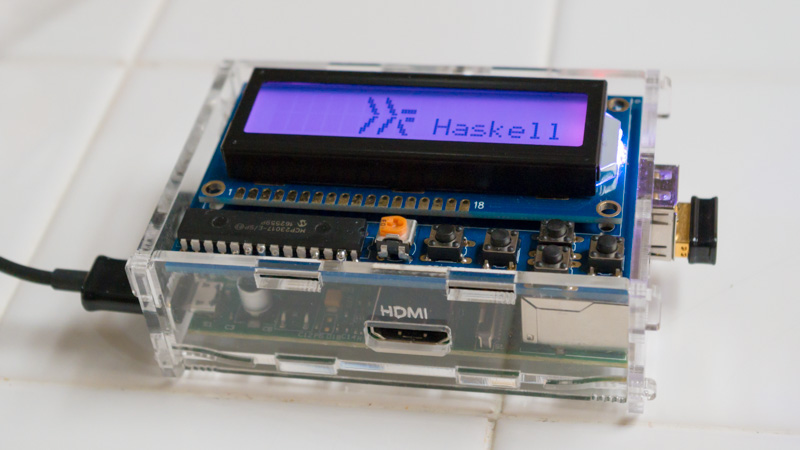pi-lcd: Control an Adafruit character LCD and keypad kit on a Raspberry Pi
This package allows using an
Adafruit character LCD and keypad kit
on a Raspberry Pi from Haskell.
Everything you need to use one of these LCDs is exposed in the
System.Hardware.PiLcd module. The submodules are only exposed
because they might be useful to reuse for other types of hardware,
such as if you are using an MCP23017 port expander or an HD44780
display controller in some other context. But if you're using the
Adafruit character LCD and keypad kit, all you need is
System.Hardware.PiLcd.
[Skip to Readme]
Modules
[Index]
Downloads
- pi-lcd-0.1.1.0.tar.gz [browse] (Cabal source package)
- Package description (revised from the package)
Note: This package has metadata revisions in the cabal description newer than included in the tarball. To unpack the package including the revisions, use 'cabal get'.
Maintainer's Corner
For package maintainers and hackage trustees
Candidates
- No Candidates
| Versions [RSS] | 0.1.0.0, 0.1.1.0 |
|---|---|
| Change log | ChangeLog.md |
| Dependencies | base (>=4.6 && <5), bytestring (>=0.10.0.2 && <0.11), clock (>=0.7.2 && <0.9), deepseq (>=1.3 && <1.5), pi-lcd, text (>=1.1 && <1.3), unix (>=2.7 && <2.8), unordered-containers (>=0.2.4 && <0.3) [details] |
| Tested with | ghc ==7.6.3, ghc ==7.8.4, ghc ==7.10.3, ghc ==8.0.2 |
| License | BSD-3-Clause |
| Copyright | © Patrick Pelletier, 2017 |
| Author | Patrick Pelletier |
| Maintainer | code@funwithsoftware.org |
| Revised | Revision 1 made by ppelleti at 2019-05-09T18:31:55Z |
| Category | Hardware, Raspberrypi |
| Home page | https://github.com/ppelleti/pi-lcd |
| Bug tracker | https://github.com/ppelleti/pi-lcd/issues |
| Source repo | head: git clone https://github.com/ppelleti/pi-lcd.git |
| Uploaded | by ppelleti at 2017-04-27T20:56:21Z |
| Distributions | |
| Executables | pi-lcd-test-rom, pi-lcd-ui, pi-lcd-custom, pi-lcd-demo |
| Downloads | 1849 total (4 in the last 30 days) |
| Rating | (no votes yet) [estimated by Bayesian average] |
| Your Rating | |
| Status | Docs available [build log] Last success reported on 2017-04-27 [all 1 reports] |



